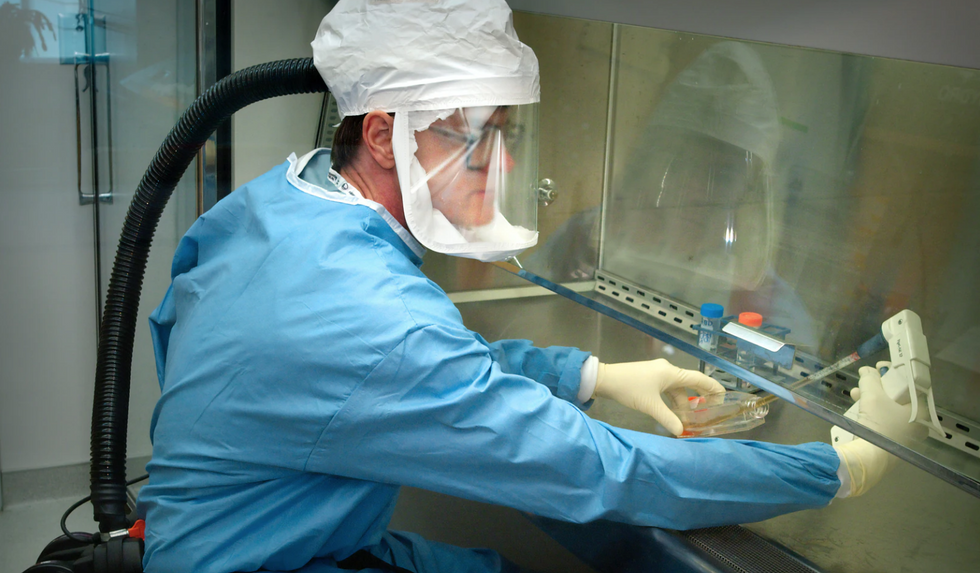If you log into any social media app, you will be overwhelmed with self-appointed experts, preaching the correct way to end this coronavirus (COVID-19) pandemic from the comfort of their La-Z-Boy chair. Aside from those dramatic children on TikTok, it's all anyone can talk about. There's an obvious reason for this — the pandemic has taken our world and flopped it on its head, bringing confusion, angst, and an obnoxious amount of sourdough bread into our lives.
All this to say, it's easy to get lost amidst the storm of arguments online. Instead, it's best to break down what's actually going on so we can have an educated perspective as we look to work together to move past our current predicament.
Vaccine hopefuls are looking at early 2021.
Scientists and medical experts across the world began testing vaccines when COVID-19 became an issue. Vaccines, for those of you who missed it in high school chemistry, are designed to activate our body's immune system to fight off infection without making us sick. This is largely trial and error, finding the right formula that safely fights off SARS-COV-2 (the technical strand of the virus that causes COVID-19) or any kind of infection, takes time.
The COVID-19 trials have made headway, with more progress made this last week, giving hopefuls like Dr. Anthony Fauci another reason to guess that a vaccine will be available by early 2021, if not the end of 2020.
An antibiotic is used to treat bacterial infections, but COVID-19 is a viral infection.
Some may wonder why the entire medical community is focused on a vaccine instead of a treatment plan. The fact of the matter is that a vaccine would have the ability to stop the virus before it landed you in a doctor's office complaining about your lack of smell. An antibiotic sounds like a great idea, until you realize that antibiotics are designed to fight bacterial infections, which COVID-19 is not (it is a viral infection). You've probably heard of physicians treating COVID-19 patients with antibiotics, but that's largely due to the unknown nature of the disease and the fact that many early patients showed signs of bacterial pneumonia (and were treated as such).
Like most viral infections, you treat COVID-19 by working to ease the symptoms you have. Wash your hands, disinfect surfaces in your home, increase your fluid intake, get plenty of sleep, boost your immune system no matter how healthy you are, and follow other directions by your primary care doctor.
SEE ALSO: Everything We Know About COVID-19 Tests, And Where You Can Get One
Herd immunity is worth defining.
Going to a "coronavirus party" to get the disease and hope your body builds antibodies? Not a good idea. When discussing herd immunity, experts are not looking at extreme scenarios of everyone purposefully sharing infection. On the contrary, herd immunity is a generally slow process, built up over time as more individuals get sick and recover from a virus, fighting off the pathogen in question. Normally, herd immunity is considered to be "achieved" if a high percentage (think 80-90 percent) of the population is immune to infection. This is often discussed in correlation with a successful vaccine, like the eradication of smallpox from the United States in 1972. Herd immunity could hypothetically happen naturally, but this would require leaps in infection that could be detrimental depending on the severity of those infected (and the ICU beds this would take up).
If enough individuals are infected, fight off the pathogen, and build up immunity for that pathogen, a disease can die out. This is a risk — it takes time, it's hard to track, and individuals who are immunocompromised are still the most at-risk group of the population.
* * *
In looking at how COVID-19 may come to an end, many reference the influenza pandemic of 1918-1919. That pandemic ended because of implementations of nonpharmaceutical interventions (NPIs) — actions that require no vaccine or medicine, just public cooperation. Congrats, many of you are already participating in NPIs with social distancing, quarantining when sick, and being considerate of those around you. Those efforts, while causing your Great Aunt Ruth to throw a fit on Facebook, do have the ability to bring us out of the current pandemic we're facing.
As an Amazon Affiliate partner, Odyssey may earn a portion of qualifying sales.







 Going to the cinema alone is good for your mental health, says science
Going to the cinema alone is good for your mental health, says science












 women in street dancing
Photo by
women in street dancing
Photo by  man and woman standing in front of louver door
Photo by
man and woman standing in front of louver door
Photo by  man in black t-shirt holding coca cola bottle
Photo by
man in black t-shirt holding coca cola bottle
Photo by  red and white coca cola signage
Photo by
red and white coca cola signage
Photo by  man holding luggage photo
Photo by
man holding luggage photo
Photo by  topless boy in blue denim jeans riding red bicycle during daytime
Photo by
topless boy in blue denim jeans riding red bicycle during daytime
Photo by  trust spelled with wooden letter blocks on a table
Photo by
trust spelled with wooden letter blocks on a table
Photo by  Everyone is Welcome signage
Photo by
Everyone is Welcome signage
Photo by  man with cap and background with red and pink wall l
Photo by
man with cap and background with red and pink wall l
Photo by  difficult roads lead to beautiful destinations desk decor
Photo by
difficult roads lead to beautiful destinations desk decor
Photo by  photography of woman pointing her finger near an man
Photo by
photography of woman pointing her finger near an man
Photo by  closeup photography of woman smiling
Photo by
closeup photography of woman smiling
Photo by  a man doing a trick on a skateboard
Photo by
a man doing a trick on a skateboard
Photo by  two men
two men  running man on bridge
Photo by
running man on bridge
Photo by  orange white and black bag
Photo by
orange white and black bag
Photo by  girl sitting on gray rocks
Photo by
girl sitting on gray rocks
Photo by  assorted-color painted wall with painting materials
Photo by
assorted-color painted wall with painting materials
Photo by  three women sitting on brown wooden bench
Photo by
three women sitting on brown wooden bench
Photo by 
 Photo by
Photo by  Photo by
Photo by  Photo by
Photo by  Photo by
Photo by 


 people sitting on chair in front of computer
people sitting on chair in front of computer











